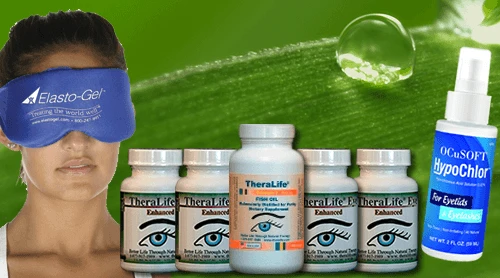Theralife.com offers a range of products designed to support ocular health, particularly for conditions like blepharitis. By focusing on improving gut health with probiotics and anti-inflammatory diets, Theralife enhances the gut microbiome, which is crucial for reducing systemic inflammation and managing immune responses. Their products, such as TheraLife Eye Enhanced, are formulated to address the root causes of eye conditions, providing relief from symptoms like eye irritation and dryness.
Theralife’s dietary recommendations, including the consumption of probiotic-rich foods like yogurt and anti-inflammatory spices like turmeric, are integral parts of their holistic approach. These interventions not only promote gut health but also help alleviate blepharitis symptoms, offering a comprehensive solution for managing eye health.
Moreover, Theralife provides extensive resources and guidance on eye health, including advice on managing related conditions like dry eyes, chalazion, and uveitis. Their expertise in integrating natural remedies and lifestyle changes, such as an anti-inflammatory diet, positions Theralife as a valuable partner in achieving optimal ocular health. By incorporating these strategies into your routine, you can benefit from improved eye comfort and overall health.
Best Blepharitis Treatment From TheraLife- When Drops Don’t Work.
Key Takeaways
- A balanced gut microbiome supports ocular health by reducing systemic and ocular inflammation linked to blepharitis.
- Probiotics maintain gut microbiome balance, potentially decreasing blepharitis flare-ups and enhancing immune modulation.
- Probiotic-rich foods like yogurt and kefir can modulate immune responses, reducing blepharitis symptoms.
- Anti-inflammatory diets, including turmeric and ginger, mitigate inflammatory processes, alleviating blepharitis symptoms.
- Gut health interventions through diet and probiotics can improve ocular surface disease associated with gut inflammation.
Understanding Blepharitis and Its Symptoms
Blepharitis, a common ocular condition, involves inflammation of the eyelid margins, often leading to discomfort and visual disruptions. You might experience symptoms like eyelid swelling, redness, and crusting, which can greatly impact daily activities.
Understanding blepharitis causes is essential for effective symptom management. Common etiologies include bacterial colonization, seborrheic dermatitis, and dysfunction of the meibomian glands. These factors disrupt the eyelid’s normal physiology, exacerbating inflammation and irritation.
For symptom management, you should consider lid hygiene as a primary intervention. This includes warm compresses and eyelid scrubbing to reduce debris and bacterial load.
In some cases, topical antibiotics or anti-inflammatory medications are prescribed to alleviate symptoms. Understanding the underlying causes aids in tailoring a personalized management plan, ensuring better control over blepharitis symptoms. Regular eyelid hygiene can significantly reduce the occurrence of blepharitis, helping to manage symptoms more effectively.
The Connection Between Gut Health and Eye Inflammation
While the connection between gut health and systemic inflammation is well-documented, emerging research suggests a potential link between gut health and eye inflammation, including blepharitis.
Gut inflammation can impact ocular health by altering immune responses, potentially exacerbating inflammatory eye conditions. Disruptions in gut microbiota may lead to systemic inflammation, which can manifest as ocular surface inflammation.
Maintaining a balanced gut microbiome might support ocular health by reducing systemic inflammatory markers. Clinical studies indicate that patients with gut inflammation often exhibit signs of ocular surface disease, highlighting this connection.
Addressing gut health through diet and probiotics could play a role in managing eye inflammation. By mitigating gut inflammation, you might improve blepharitis symptoms, enhancing overall ocular health.
A diet incorporating probiotics and anti-inflammatory foods can potentially alleviate symptoms by reducing gut inflammation and supporting immune health.
Exploring the Gut Microbiome’s Role in Immune Function
You mightn’t realize it, but your gut microbiome plays an essential role in modulating your immune system. Research indicates that the composition of gut flora can greatly affect your body’s inflammatory responses, potentially impacting conditions like blepharitis. Understanding this relationship could lead to new therapeutic strategies that harness the microbiome to bolster immune function and mitigate inflammation. The Autoimmune Diet (AIP) focuses on gut health as a primary factor in reducing inflammation, which addresses conditions like adrenal fatigue, liver congestion, and hormone imbalances.
Gut-Immune System Connection
Emerging research underscores the intricate relationship between the gut microbiome and the immune system, highlighting the microbiome’s essential role in modulating immune responses. Your gut hosts trillions of microorganisms that actively communicate with immune cells, influencing their activity and homeostasis. This gut-brain connection is pivotal, as gut-derived signals can alter central nervous system functions, thereby affecting systemic immune responses. A healthy microbiome can enhance your immune system’s ability to differentiate between harmful pathogens and benign antigens, potentially reducing inflammation. Conversely, dysbiosis, or microbial imbalance, might trigger inappropriate immune responses, exacerbating conditions like blepharitis. For those suffering from autoimmune conditions, such as Sjogren’s syndrome, addressing gut health could be integral to managing symptoms like dry eyes. Understanding and leveraging this connection through targeted probiotics or dietary interventions could offer novel approaches to managing immune-related ocular conditions.
Microbiome’s Impact on Immunity
The intricate ecosystem of the gut microbiome plays a critical role in shaping immune function. You might be surprised to learn that microbiome diversity is essential for robust immune modulation. Diverse microbial populations in the gut enhance the immune system’s ability to distinguish between harmful pathogens and beneficial microbes. This diversity supports the production of short-chain fatty acids, which are vital for regulating inflammation and maintaining gut barrier integrity. When microbiome diversity decreases, immune dysregulation can occur, contributing to conditions like blepharitis. By promoting a balanced microbiome, you can potentially enhance immune responses and mitigate inflammatory processes. Probiotics and dietary interventions targeting microbiome diversity might offer promising strategies for immune modulation and maintaining overall eye health. Additionally, Omega-3 Fish Oil Benefits include enhancing natural tear production and reducing inflammation, which may also support overall eye health in conjunction with a balanced microbiome.
Gut Flora and Inflammation
Understanding the microbiome’s impact on immunity leads naturally into examining how gut flora influences inflammation.
Your gut flora diversity plays an essential role in regulating immune responses, effectively modulating inflammation triggers. A healthy, diverse microbiome aids in maintaining homeostasis by preventing the overactivation of the immune system, which can lead to chronic inflammation.
Disruptions in gut flora diversity, such as dysbiosis, can enhance inflammation triggers, potentially exacerbating inflammatory conditions like blepharitis.
Research indicates that certain bacterial strains within the gut produce anti-inflammatory metabolites, which are significant in counterbalancing pro-inflammatory signals.
Consequently, fostering a diverse gut microbiome through probiotics and an anti-inflammatory diet may offer a therapeutic approach to managing inflammation and its related symptoms, ultimately supporting ocular health in blepharitis. Chronic conditions such as blepharitis can be exacerbated by meibomian gland dysfunction, which is closely linked to persistent inflammation and dry eye symptoms.
How Probiotics Can Support Eye Health
While the link between gut health and eye conditions like blepharitis mightn’t be immediately obvious, there’s growing interest in how probiotics can play a role in supporting eye health.
Probiotic benefits extend beyond digestive health, potentially influencing ocular health by modulating systemic inflammation and enhancing immune responses. Here’s how they can help:
- Microbial Balance: Probiotics help maintain a balanced gut microbiome, which may reduce systemic inflammation linked to eye diseases.
- Immune Function: Enhanced immune modulation can potentially reduce the frequency of blepharitis flare-ups by mitigating inflammatory responses.
- Barrier Integrity: Probiotics strengthen gut barrier integrity, potentially preventing pathogenic translocation that could exacerbate ocular inflammation.
Incorporating probiotics might offer a novel approach to managing blepharitis through improved systemic health. Essential oils like tea tree oil have shown anti-inflammatory and antiseptic properties that may complement probiotic benefits in managing eye health.
Anti-Inflammatory Diets: A Path to Reducing Eye Irritation
Exploring how diet can mitigate inflammatory processes offers promising insights into reducing eye irritation, including conditions like blepharitis.
Incorporating anti-inflammatory spices and healing herbs into your diet can play a significant role in modulating inflammation. Spices such as turmeric and ginger are known for their potent anti-inflammatory properties, which could help alleviate symptoms of eye irritation by reducing systemic inflammation.
Clinical studies suggest that certain herbs like chamomile and calendula may also contribute to soothing inflammation due to their bioactive compounds.
By strategically including these elements in your diet, you can target inflammatory pathways, potentially reducing the frequency and severity of blepharitis symptoms. Additionally, maintaining a balanced intake of nutrients and avoiding inflammation-promoting foods can further support eye health and overall wellbeing.
Foods to Include for a Healthier Gut and Eyes
To support both gut health and eye wellness, incorporate probiotic-rich foods like yogurt and kefir, which enhance gut microbiota balance. Include anti-inflammatory ingredients such as turmeric and leafy greens to reduce systemic inflammation that can exacerbate blepharitis. Additionally, nutrient-dense superfoods like berries and nuts provide essential vitamins and antioxidants vital for maintaining eye health. The AIP diet emphasizes minimally processed, nutrient-dense foods, which can help reduce inflammation and improve overall health.
Probiotic-Rich Food Choices
How can incorporating probiotic-rich foods into your diet support both gut health and eye health, particularly in managing blepharitis?
Probiotic supplements and fermented foods play a significant role in promoting a balanced gut microbiome, which is essential for reducing inflammation—a key factor in blepharitis.
By enhancing gut flora, these foods may help modulate immune responses and reduce the frequency of blepharitis flare-ups.
Consider adding these probiotic-rich options:
- Yogurt: Contains live cultures that enhance gut bacteria diversity.
- Kefir: A fermented drink with a potent mix of bacterial strains, aiding digestion.
- Sauerkraut: Fermented cabbage rich in probiotics and beneficial enzymes.
Incorporating these foods into your diet can synergistically support your gut and ocular health, potentially mitigating blepharitis symptoms. Additionally, fish oil serves as a natural anti-inflammatory and tear thickener, providing further relief from blepharitis and dry eye symptoms.
Best Blepharitis Treatment From TheraLife- When Drops Don’t Work.
Anti-Inflammatory Ingredients
While your gut and eye health might seem unrelated, they’re intricately connected through systemic inflammation. Incorporating anti-inflammatory ingredients can mitigate blepharitis symptoms by reducing gut inflammation.
Start by integrating anti-inflammatory spices like turmeric and ginger into your diet. Turmeric contains curcumin, a compound with potent anti-inflammatory properties, and ginger helps modulate inflammatory pathways.
Additionally, consider herbal remedies such as chamomile and green tea, both rich in polyphenols that exert anti-inflammatory effects. These ingredients can modulate gut microbiota, reducing systemic inflammation that exacerbates ocular conditions.
Consuming these anti-inflammatory ingredients consistently can enhance overall health by fostering a balanced gut environment. Prioritize these dietary modifications to promote ocular health through gut inflammation control.
Nutrient-Dense Superfoods
Although it may seem challenging to address both gut and eye health simultaneously, incorporating nutrient-dense superfoods into your diet can be an effective strategy. Consuming specific foods enhances nutrient absorption and supports ocular and gastrointestinal well-being.
You can optimize your diet by focusing on these superfoods:
- Leafy Greens: Rich in lutein and zeaxanthin, these compounds reduce oxidative stress and inflammation, benefiting both eyes and gut microbiota.
- Berries: High in antioxidants and fiber, they support gut health and reduce systemic inflammation, essential for managing blepharitis symptoms.
- Seeds: Chia and flaxseeds provide omega-3 fatty acids and fiber, promoting mucosal immunity and healthy gut flora.
Consider blending these into superfood smoothies for a convenient, nutrient-packed meal that enhances nutrient absorption and supports your health goals.
The Impact of Processed Foods on Gut and Eye Health
Processed foods can greatly impact gut and eye health due to their high content of additives, preservatives, and low nutritional value. Consuming such foods can disrupt gut microbiota, leading to dysbiosis—a condition linked to systemic inflammation.
The processed food effects extend beyond the gut, acting as potential eye inflammation triggers. Blepharitis, an inflammatory eye condition, may be exacerbated by a diet high in processed foods. These foods can increase pro-inflammatory cytokines, contributing to ocular surface inflammation.
Clinical studies suggest that reducing processed food intake might alleviate symptoms of blepharitis. By focusing on whole, nutrient-dense foods, you can support gut health, thereby potentially reducing inflammatory responses affecting the eyes.
A diet mindful of these factors is vital for maintaining overall health.
Integrating Probiotics Into Your Daily Routine
Incorporating probiotics into your daily routine can greatly enhance gut health, which may, in turn, benefit eye conditions like blepharitis. Probiotic supplements are pivotal in maintaining a balanced gut microbiome.
To effectively integrate them, consider these steps:
- Choose the Right Strain: Different probiotic strains offer varying benefits. Lactobacillus and Bifidobacterium are commonly recommended for gut and immune health, potentially aiding in reducing inflammation linked to blepharitis.
- Consistent Intake: Make probiotic supplements a part of your daily routine by consuming them at a consistent time each day, such as with breakfast, to establish a habit.
- Monitor and Adjust: Track your symptoms and consult healthcare professionals to adjust strains or dosages, ensuring maximum benefits for both gut and eye health.
Lifestyle Changes to Support Gut and Eye Health
When seeking to improve gut and eye health, adopting specific lifestyle changes can be vital. Lifestyle modifications, including dietary adjustments, play an essential role in managing blepharitis. A diet rich in anti-inflammatory foods like omega-3 fatty acids and antioxidants supports both gut and ocular health. Regular exercise enhances gut microbiota diversity and reduces systemic inflammation, positively affecting eye conditions. Hydration is fundamental, as proper fluid intake aids in nutrient absorption and toxin elimination.
| Lifestyle Modifications | Dietary Adjustments | Outcome |
|---|---|---|
| Increase physical activity | Consume omega-3 fats | Enhanced gut microbiota diversity |
| Stay hydrated | Include antioxidants | Reduced systemic inflammation |
| Reduce stress | Avoid processed foods | Improved eye health |
| Prioritize sleep | Balance macronutrients | Better nutrient absorption |
| Practice mindfulness | Limit sugar intake | ideal toxin elimination |
These evidence-based strategies support sustainable health improvements.
Best Blepharitis Treatment From TheraLife- When Drops Don’t Work.
Frequently Asked Questions
Can Stress Affect Gut Health and Subsequently Worsen Blepharitis Symptoms?
Yes, stress can greatly impact your gut health, which in turn may exacerbate blepharitis symptoms.
The gut-brain connection is well-documented, and stress management is essential. When you’re stressed, your body releases hormones that can disrupt gut microbiota, leading to inflammation.
This inflammatory response may worsen blepharitis by affecting ocular surface health. Implementing effective stress management strategies can help maintain gut equilibrium and potentially alleviate blepharitis symptoms.
Are There Specific Probiotic Strains Most Beneficial for Eye Health?
When considering eye probiotics, you’ll find Lactobacillus and Bifidobacterium strains particularly beneficial.
These strains, known for their anti-inflammatory properties, can be sourced from fermented foods and supplements.
Clinical studies suggest they help maintain ocular surface health by modulating immune responses.
Incorporating these specific probiotic sources into your diet may support eye health and potentially alleviate symptoms.
Always consult with a healthcare provider to tailor probiotics to your needs.
How Long Does It Take to See Improvements in Blepharitis With Dietary Changes?
When you make dietary adjustments for blepharitis, symptom relief mightn’t be as immediate as a telegram.
Typically, you’ll begin noticing improvements within 4 to 8 weeks. Research indicates that consistent adherence to an anti-inflammatory diet plays a critical role.
Clinical studies suggest that the interplay between gut microbiota and inflammation is complex, so patience and persistence are vital.
Consult your healthcare provider to verify these changes align with your individual health needs.
What Lifestyle Habits Can Negatively Impact Both Gut and Eye Health?
You might negatively impact both gut and eye health by maintaining a poor diet high in sugar, engaging in a sedentary lifestyle, or consuming excessive alcohol.
Smoking habits can further deteriorate your health, while lack of sleep disrupts gut microbiota balance and ocular surface integrity.
Evidence shows these factors contribute to inflammation and compromised immune function, emphasizing the importance of adopting healthier lifestyle choices to support overall well-being and prevent systemic diseases.
Can Allergies Influence the Relationship Between Gut Health and Eye Inflammation?
Imagine experiencing itchy eyes after eating certain foods.
Allergy triggers can indeed influence the relationship between gut health and eye inflammation. When allergens enter the body, they can prompt an immune response, exacerbating inflammation in both the gut and eyes.
Clinically, this connection is significant since inflammation is a key factor in both systems. Addressing allergies through diet modifications might help reduce overall inflammatory responses, benefiting both gut and eye health.
Best Blepharitis Treatment From TheraLife- When Drops Don’t Work.
Conclusion
TheraLife’s products offer numerous benefits to customers, particularly those dealing with blepharitis and other eye-related conditions. By incorporating probiotics and anti-inflammatory diets, TheraLife supports optimal gut health, which is crucial for overall wellness, including eye health. The company’s formulations are designed to enhance the immune system, potentially reducing symptoms of blepharitis. Customers can expect improved gut and eye health by integrating TheraLife’s products alongside a nutritious diet, minimizing processed foods. These small lifestyle adjustments can lead to significant improvements in how individuals feel and see, enhancing their quality of life both literally and figuratively.





